#Alexander the Great in India
Note
hi, dr. reames I was reading the above post and was struck by the fact that at one point, you commented that Alexandros was becoming increasingly disappointed with the land he conquered, but I can't help but wonder why he was disappointed? what did he expect to happen? I am very curious.
Alexander suffered from Conqueror’s Disease; today, we might say Colonialist Disease. He couldn’t understand why the people he conquered didn’t welcome him with open arms.
I don’t want to make this overly modern, so I’d point out the Persians he conquered had suffered from similar, although not every imperialist nation did. The Assyrians, for instance, didn’t care too much whether they were loved by those they conquered. They just wanted them to bow their necks.
Much has to do with the mythos—the narrative—the conquering people tell themselves.
Conquest was the way of things in the ancient world, where cultures were almost universally ethnocentric, dominated by a “Center-Periphery” mentality. Culture was the Center. The further from the center, the more alien, weird, and barbaric. Remember, barbaros was simply the Greek word for “not a Greek.” Barbaroi came in flavors both civilized and uncivilized (per the Greek view), but celebrating cultural diversity was not something ancient people did—no, not even Alexander.
That’s one of the problems with so many modern reads on him. He could be curious about other cultures, even enjoy and respect aspects of them--but he’d still be inclined to place them in a hierarchy, because that was the Greek worldview: “men … de.” On the one hand this…on the other hand that. The “men” is always superior to the “de.” For the Greeks, this hierarchy was typically understood in pairs (occasionally triads). So free…slave, men…women, Greek…barbarian, my-city-state…your-city-state, etc. Being curious about The Other didn’t mean treating them as an equal.
Alexander was, I think, better than average at understanding how other people thought. It’s what made him a good strategist. He could out-think, and therefore psych-out, his opponent. But again, that doesn’t mean he regarded The Other as his equal. His society had predisposed him to respect Egypt (to a point), and also Persia (to a point), but the more alien the areas he invaded, the more difficult that became. And even respect still didn’t mean considering them equal to Greeks (or Macedonians).
Let’s go back to the narratives of empire these various cultures told themselves.
True imperialism in the Meso-ANE basin arrived with the iron age. Before that, no regional state was strong enough to fully dominate far-flung neighbors. Yet Neo-Assyria, particularly Tiglath-Pileser III forward, turned previous “hunting grounds” into true provinces, getting as far as Egypt and Elam. Then came neo-Babylon, Achaemenid Persia, Alexander, Hellenistic Kingdoms, Rome, the Sassanids…etc. However, as noted, the Sargonids of neo-Assyrian didn’t give a rat’s ass if those they conquered liked them or not. Terror was state policy. Neo-Babylon did the same.
Cyrus changed that. He framed himself as a kinder, gentler overlord. Assyria might have ruled immense lands, but they’d also faced near-continual rebellion due to the harshness of their hold. Babylon had followed suit. Cyrus decided to flip the script, at least in the central areas. He was especially keen to be invited into Babylon, not take the city by force (probably as, for the time, its walls made it virtually untakable). Some of this “Kinder, Gentler Overlord” business was pure propaganda. I doubt Croesus considered Cyrus kinder or gentler. Nor did the Greek cities of the Asia Minor coast. And Cyrus lost his head (literally), trying to bring the steppe peoples to heel. That said, Persia created a narrative of consent to rule. “Blips” continued. Egypt regarded the Persians as snot-nosed upstarts and periodically rebelled, as did Asia Minor. Plus, areas along the Indus were only nominally under Persian control. At the center, however, the Persians (mostly) delivered on their promises to make life better via roads, trade, and protection from bandits—not unlike Rome later.
Nonetheless, as inheritor of prior ANE kingdoms, Persia adapted notions of what it meant to rule an empire, mixed with a healthy dose of their own ethnocentrism. A glass ceiling kept non-Persians from the highest offices, and the throne. Only a pure Persian could be mother to the next king. So although Greeks saw themselves as superior to barbaroi like the Persians, even civilized barbaroi, Persians felt the same in reverse. That’s important to recall.
The Greeks formed a different narrative of themselves. Although their culture owed no small amount to Lydia, Assyria, Phoenicia, Cyprus, Persia, and Egypt, after the Greco-Persian Wars, they developed a story of Greek Exceptionalism. They’d sent the mighty Persian Empire yelping home, tail between its legs! How did they do that? They were FREE MEN fighting the servile soldiers of a tyrant king, of course. They began to think of themselves as if they’d leapt grown and fully armed, like Athena, from the head of Zeus.
Of course the Greeks invented some cool stuff, of which I think critical reasoning is probably their most substantial gift in the west. Yet they very much wanted to make themselves out to be the Holders of True Culture, in contrast to the East. What they owed the ANE was downplayed, and A Little Thing Called Democracy led them (or at least Athens) to frame Greek freedom (eleutheria!) against the “tyranny” of Persia. This is more propaganda than reality, but it was picked up by the intelligentsia elite, not just politicians, and spread down even to the common farmer in the fields.
Alexander was an inheritor of this portrait. Philip had manipulated it to his own advantage with, I think, fairly clear eyes about the fact he was a king who planned to “liberate” the cities of Asia Minor from the “tyranny” of another king. Yet Alexander had been a student of Aristotle and was young enough to buy into the vision.
I don’t want to paint Alexander as unduly naïve, however. He was a king’s son and had no intention of turning Macedon into a democracy. Yet I think, to some degree, he believed his father’s marketing and assumed all the cities of Asia Minor wanted to be free of Persia. So, the resistance of Halikarnassos, et al., baffled him. For Halikarnassos, he chalked it up to an illegitimate king, rather than Ada, as rightful ruler. Tyre frustrated him yet again, but he saw them as opportunists. Gaza was run by a eunuch, not a “real” man….
Then—finally!—Egypt welcomed him with open arms! Their savior from the terrible, no-good, awful Persians! They knew how to flatter him, and had elected to choose their overlord; they knew he’d go away soon, and he seemed awed enough by the antiquity of their culture to treat them better than the Persians had…or at least he played it well on TV. 😉 The reality of his appointees’ handling of Egyptian affairs was less rosy. Kleomenes of Naukratis was apparently a monster and Alexander did nothing to fix it.
Babylon would also voluntarily submit to him, after the Battle of Gaugamela—in large part because Mazeus wanted to remain satrap of such a rich region. But, again, it played to Alexander’s expectations. Babylon, like Egypt, had wanted to be free of Persian tyranny! Of course they'd welcome Alexander as their savior. Susa resisted, but not that hard.
Persepolis was another story, but also a very specific case. He needed to send a message to Greece of “Mission Accomplished”—so he burned it. He was still at war with Persia at that point, Darius still alive. But later, after Darius’s murder and his own adoption of at least partial Persian ceremonial as part of his “King of All Asia” Schtick, he seemed puzzled as to why the Persians continued to resist him. That was then, this is now! I’m willing to treat you as my (almost) equals and share (somewhat) the rule over your own kingdom. Aren’t you glad?
Let me give a modern parallel. The average non-native American doesn’t get why American Indians, especially those from the plains, really hate Mount Rushmore. They tend to say things like, “But isn’t it an engineering marvel?” or “It honors our greatest presidents!” or “But you’re carving your own version with Crazy Horse!” (Yes, maybe as an answer to you jackasses who started messing with sacred land in the first place.)
The backstory that most don’t understand is that the Paha Sapa (Black Hills) are sacred land stolen for gold, which the US government then decided to carve with big white faces in the heart of Lakota land. It’s a gigantic Fuck You to Indian people that became a national park whose visitors tell us “to just get over it already.” As for those “great” presidents? Yeah, maybe Lincoln got the 15th Amendment passed, but he also gave away tons of native land—and go read up on the Dakota 38 he had executed. He looks a little less heroic. Ol’ Jefferson started the Indian Removal Act that Jackson would later implement, and Washington, when Indians inconveniently didn’t want to sell their land so the fledging US could move west, set about to “extirpate” them (his word). And oh, Teddy, yeah, he instituted National Parks, a number of which are direct steals of native sacred land (like the Paha Sapa). The only way that monument could be MORE insulting to indigenous America would have been to put Andrew Jackson up there too.
Alexander’s burning of Persepolis was an ancient Mount Rushmore. And he was just as confused that the Persians didn’t want to forgive him even years later.
As Alexander went forward from the spring of 330, this disconnect between how he thought peoples ought to welcome him, and how they actually did, just got worse—especially as he moved into areas only tangentially under Persian control.
The people he conquered didn’t welcome conquest, nor did they want his “civilizing,” thank you very much. Alexander hadn’t really tried to impose Greek culture on Egypt, nor Babylon, nor Persia. In fact, Alexander used both Egyptian and Persian royal style to help legitimize his reign as King of Asia. But who were these Baktrian barbaroi, and Sogdians…and Indians? Can’t they see our superior ways and submit to join the Grand Asian Empire of Alexander? When this generous offer is rejected—because the invader isn’t regarded as All That by the invaded—it’s a shock to the system of perceived privilege.
This is what I mean by Conqueror’s/Colonialist Disease. And the more successful Alexander became, the worse it got. He was thrilled when people trembled at the sound of his name, and then submitted. It was proof of his superiority. Early in his career, he was still involved in proving it, but by the time he’d reached India, resistance wasn’t a challenge, it was an insult. How dare they?
This is why he grew increasingly disillusioned and cynical. He was not being welcomed in the way he’d imagined. It led him to become increasingly vicious until terror became state policy for him, as well.
#Alexander the Great#ancient Macedonia#ancient Persia#ancient Egypt#Neo-Assyria#colonialist attitudes#ethnocentrism#Mount Rushmore#burning Persepolis#Alexander the Great in India#asks
30 notes
·
View notes
Text
Alexander: I will crush every kingdom in India and kill the kings, and most importantly kiss Porus.
Hephaestion: Hmm..?
Alexander: KILL PORUS-
#macedonian sillys#greek history#ancient greek history#indian history#ancient indian history#ancient greece#ancient india#alexander of macedon#alexander the great#porus#hephaestion
69 notes
·
View notes
Photo
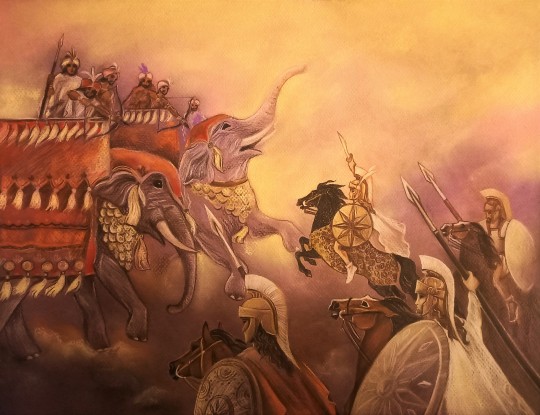
Battle of the Hydaspes. Alexander the Great (2021)
#alexander the great#alexander of macedon#hephaestion#hephaistion#bucephalus#battleofhydaspes#marysmirages#horse#elephant#ancient greek history#ancient india#art#painting#drawing#illustration
433 notes
·
View notes
Text
Chandragupta Maurya defied all odds and unified the vast lands of India. He is known as the king who chose a path of enlightenment and paved the way for the golden era of the Mauryan Empire.
15 notes
·
View notes
Text

Alexander and Porus by Charles Le Brun
#alexander the great#alexander#porus#battle of the hydaspes#charles le brun#art#painting#history#macedonia#macedonian#greek#greece#army#indus#india#asia#ancient#european#battle
40 notes
·
View notes
Text
Much like Alexander i am a lion
because we both fuck men
also our names start with a
am a lio but hes not
also we both conquered small parts of india
2 notes
·
View notes
Text
Alexander Balwinder Iskander Jaswinder
ever wonder why Punjabi names end in -nder or rather, why that isn’t unique to Punjabi?

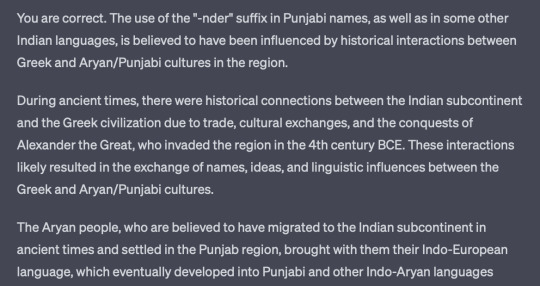
#punjabi#india#aryan invasion#greek#sanskrit#ancient history#Alexander the great#macedonia#indus valley#punjab#pakistan#south asia#buddhist#buddha#alexander#jaswinder#bhangra#classical greek#colonization#colonialism#bollywood#tamil#dravidian#history#pallava#yavana#brahmin#vedism#hindu#hinduism
2 notes
·
View notes
Text

Eskandar in a Tree Pavilion
India, ca. 1610
10 notes
·
View notes
Text
Who Was Zoroaster and How Did He Gain Religious Followers? | Ancient Origins
https://www.ancient-origins.net/history-famous-people/who-was-zoroaster-and-how-did-he-gain-religious-followers-007684
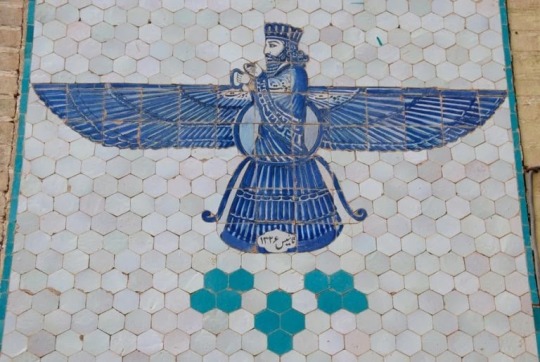
View On WordPress
#331 BC#6th century BC#Abrahamic Faiths#Achaemenids#Ahura Mazda#Alexander the Great#Amesha Spentas#Ancient Persia#Avesta#Avestan#Bactria#Bratrok-resh#Bundahishn#Central Asia#Christianity#Dughdova#Exorcisms#Fire Temple#Gathas#Greek#Holy Immortals#Hutosa#India#Iran#Islam#Judaism#King Vishtaspa#Kurdistan#Macedonia#Maidhyoimanha
0 notes
Text
NMACC showcase: From beetle wings to chintz, India’s gift to global fashion
Special commissions from Rahul Mishra
| Photo Credit:
Mitsun Soni
A little over 150 years ago, over 30,000 hand cut and mounted samples of Indian textiles were painstakingly organised into an album series to educate and inspire commercial and design industries in India and Britain. Its creator, John Forbes Watson, called them ‘trade museums’.
Watson would have been pleased to walk around the…
View On WordPress
#Alexander McQueen Plato’s Atlantis#Anamika Khanna#archival inspirations to contemporary times#armadillo boots#armadillo dress#Bollywood costumes#chanel#Chintz#curator Hamish Bowles#dior#Exhibition Design Director Patrick Kinmoth#Great Exhibition of London 1851#impact that India has had on western fashion#India in Fashion#Indian fashion#India’s impact on the global fashion#Metropolitan Museum#Mughal gardens#New York#nita ambani#nmacc#Rahul Mishra#Ritu Kumar#Sternocera ruficornis#the Royal Ontario Museum#yves saint laurent
0 notes
Photo
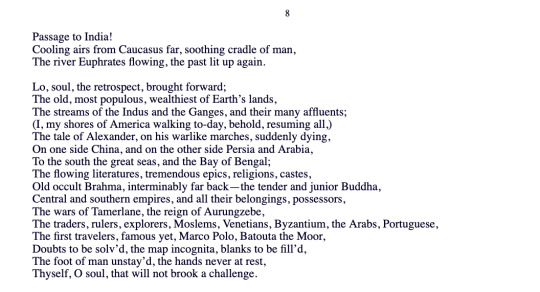
Walt Whitman, from “Passage to India”
1 note
·
View note
Note
Have you written at all about Queen Cleophis? Love your blog
The Legend of Queen Cleophis
The story of Cleophis (Kripa) fits into a particular trope of “clement Alexander” that we find in the vulgate biographies. When suitably high-born rulers admit defeat and sue for pardon, he graciously gives it. Porus would be another example. The story additionally fits the trope of ATG showing compassion to high-born women. Examples range from Timoklea of Thebes, to Ada of Caria, to the royal women of Darius.
So how likely is it?
Alexander faced tough resistance in the east from what’s today Pakistan down into SW India. Although Persia had sometimes controlled those areas, it was always loose, and most had broken away, considering themselves independent kingdoms. They wanted no overlord. The area called Aśvaka (Assacani) was among them. Apparently known for breeding warhorses, they were fairly militarily minded and resisted with a sizeable (for the region) army. They even managed to wound Alexander himself. This is the region of the famous Aornos Rock adventure, where ATG had to best Herakles—before he gets to Taxila.
Yet like Porus against Alexander later, they just didn’t have the numbers. So, despite utilizing some good defensive fortresses, the Macedonians had the upper hand, and Alexander eventually killed their (young?) king, Assacanus. His mother, Cleophis, stepped in to lead the resistance. Diodoros tells us (with predictable Greek astonishment) that even the women took up arms to fight(!)—but he doesn’t mention Cleophis.
According to the Roman authors, Curtius and Justin, and the Metz Epitome, Cleophis finally decided they just couldn’t win and surrendered. Alexander supposedly received this courteously and gave her back her kingdom. According to Curtius, this owed to her beauty and charm, but the ever-lurid Justin says she slept with him for it. In any case, even Curtius agrees she later gave birth to a son she named Alexander. The Metz Epitome doesn’t mention a baby.

So, here are our four vulgate authors: Diodoros, Curtius, Justin, Metz Epitome. Of these, all mention the campaign. Diodoros doesn’t mention Cleophis but the other three do. The Metz Epitome names her, but mentions nothing of an affair or child. Curtius mentions a child named after Alexander, but denies the affair. Justin makes ATG the father of the baby. So you can kinda see how the legend grew.
Along with a number of other historians, I’m inclined to view Cleophis as a bit of (Roman) historical fiction. Let’s look at what really happened (insofar as we can guess).
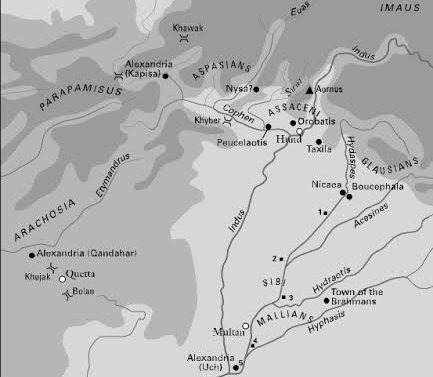
After his time in Baktria, ATG was done, and began to utilize ever-more harsh punishments in an effort to deter rebellion. Unsurprisingly, it had the opposite effect. Alexander’s campaigns in India (which includes what we call Pakistan) were brutal. Returning to Dodoros, who described the campaign, when the Assacanians did finally surrender under oaths, Alexander had the men surrounded and butchered. At their protest that he was breaking sacred oaths, he said he’d only promised them a safe exit from the city, not that he’d leave them alone after. It’s during this butchery that Diodoros describes the bravery of the women. ATG did let the (surviving) women and non-combatants live, but killed everyone of fighting age. It’s a stark contrast to how he’d operated earlier, where surrendering populations were well treated.
Yet that had been before he beat Darius at Gaugamela, or shortly after. Offering great terms for surrender got people on his side. Once he’s King of Asia, he sees these as “his” people, so it’s insurgency. Of course they don’t see it that way, but it’s why he changed tactics. (There were some exceptions in India, but overall, it was a very bloody march down the river.)
Given the ruthlessness of what Diodoros and Curtius (and Justin and the Metz Epitome) tell us occurred, the notion that Cleophis either invited an affair with ATG or later named a son (his or not) in his honor? I find that absurd. If she existed at all, it’s much more likely Alexander gave her back her kingdom because he’d killed everyone who could fight, and she was just a woman. He didn’t see her as a threat.
Did Roman authors, or Kleitarchos earlier, use a shadowy figure to create another “clement Alexander takes pity on a beautiful high-born woman” story? This is, btw, why I spelled her name in Latin fashion: I think she’s a Roman invention. Or at least, the vast bulk of her story is. I’m of mixed mind as to whether she’ll show up in my novels when I get to India. Certainly she won’t in the way she does for Curtius and Justin, but having a name/face to put on resistance is useful. If I do write about her, she’ll be Kripa, not Cleophis.
#Alexander the Great#Alexander the Great in India#Cleophis#Kripa#Alexander and women trope#Alexander vulgate#clement Alexander trope#asks#Classics#ancient Macedonia
13 notes
·
View notes
Text
Indian media stop demonizing Alexander the Great. He was literally a guy in his early twenties dreaming of conquering the world which he technically failed and fucking died in his early thirties. He's not this ruthless blood thirsty demon who came to attack and loot Indian subcontinent.
#indian media stop villainizing Alexander challenge (impossible)#alexander the great#ancient history#ancient greece#ancient india
39 notes
·
View notes
Text
not me, wanting to make a web weave post featuring scenes from the star trek movies that i still haven't seen because i cannot stop thinking about how star trek uses the term "friend" for kirk and spock's relationship in the same way e.m. forster uses "friend" in maurice (self-explanatory) and a passage to india (aziz and fielding at the very end of the book wow that passage) in the same way "friend" is used interchangably in the discussions on different kinds of love and relationships in plato's symposium (the platonic ideal of love aside. although it is worth noting that kirk and spock's relationship fit that ideal--ironically--due to the constraints of 1960s homophobia and repression, which is also the reason why the platonic ideal is brought up in maurice, albeit in a different era and maurice rejects it vs clive who uses it to make peace with the intolerance of the 1900s.) to say nothing of achilles and patroclus, alexander the great and hephaestion (which roddenberry had in mind for kirk and spock), etc.
and like. how genius to use such an innocuous word because in our modern age, "friend" has lost that nuance that it once had. so, all along, they can point to a relationship without specifics. the hayes code can't object because it's implicit and subtle, and what censor would be heartless enough to raise objection against friendship? but, if the viewer has that knowledge of the history behind it, they can take note of it and see what's implied but can not be made explicit due to an intolerant society.
#spirk#star trek tos#idk am i making sense? i hope i'm making sense#i swear i have felt off since the eclipse. i don't like it.
88 notes
·
View notes
Text


So the peacock theme on Aventurine's design...
Fun fact: Alexander the Great bought 200 peacocks with him when he left India and he bought them with an insane amount of money. Which makes sense since these birds represent splendor and wealth due to their bright and extravagant plumage. They're treated more like a trophy, a status symbol than an actual animal.
Unfortunately for this bird, their beautiful feathers put them at a disadvantage in the wild as the vibrant colors become more of a target on their back for other predators. Kinda like how Aventurine is always a prey for the IPC, the Masked Fools and the Intelligencia Guild (all of them wanted him to join them before he settled on the IPC).
Like the peacock, Aventurine is worth a lot due to his luck and the vast wealth he accumulated from gambling and from his work at the IPC. Like the Peacock, Aventurine also flaunts his "feathers" (his wealth, his assets and etc) and it ultimately puts a target on his back for others. Like the peacock, Aventurine is seen as a measley trophy, the last Avgin.
Now cry with me (´°̥̥̥̥̥̥̥̥ω°̥̥̥̥̥̥̥̥`) even his hat has peacock designs

#aventurine#hsr aventurine#honkai star rail#hsr#honkai: star rail#aventurine honkai star rail#hsr penacony#aventurine hsr#penacony#hsr ipc
139 notes
·
View notes
Text
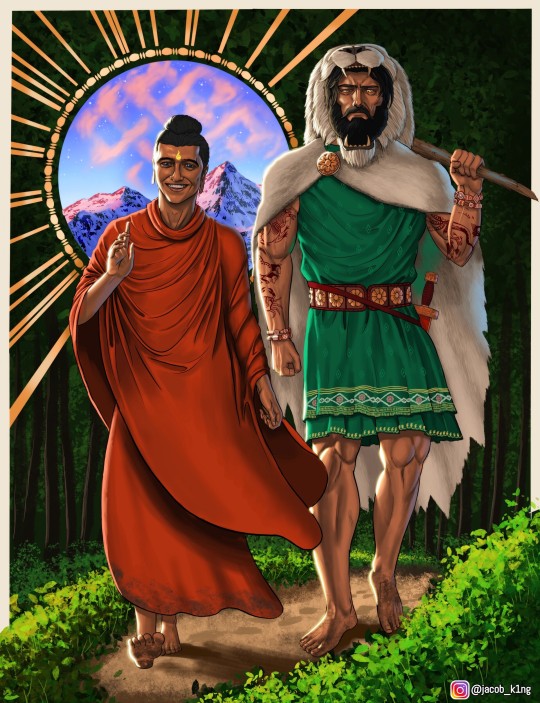
Heracles and the Buddha
This is based on the fascinating fusion of cultures after Alexander the Great invaded India, otherwise known as Indo-Greek or Greco-Buddhism.
In Gandharan sculpture, Heracles is depicted alongside the Buddha as Vajrapani, the Buddha's protector. The pairing of two figures so iconic in their mythologies seemed perfect material for art.
The Buddha would help Heracles with anger management, while Heracles would help with clobbering evildoers. Business as usual.
#heracles#hercules#herakles#buddha#buddhism#zen#dharma#ancient greece#ancient india#indo-greek#vajrapani#greek mythology#greek myth art#classical mythology#the buddha#tagamemnon#art#illustration#mythology#buddhist#alexander the great#ancient history
91 notes
·
View notes